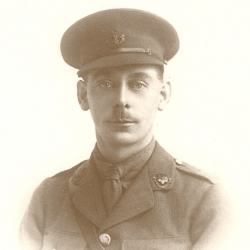Laird Kirwan was born on April 14, 1894 in London to John William Kirwan, a successful wholesale Jeweler, and Caroline Marian Kirwan (née Colins). He was the youngest of six children although his older brother Howard had died shortly after birth when he was just 7 months old. In 1911 he was living with his parents and four older sisters in Islington.
One month after the outbreak of war, on September 5, 1914, Laird joined the Honorable Artillery Company as a Private (#1931) and was assigned to Number 2 Company, 2nd Battalion. He was granted a commission as a temporary Second Lieutenant with the 10th Battalion, The Prince of Wales’s Volunteers (South Lancashire Regiment) on January 26, 1915.
He deployed to Gallipoli, and on October 7, 1915 was attached to the 1/9th Battalion, Manchester Regiment along with 4 other junior officers from the Essex and South Lancashire Regiments. There is no official mention of his movements or activities at Gallipoli with the 9th Manchesters and on December 8, 1915 he was transferred and attached to the 10th Manchesters along with another subaltern, 2/Lt. George Greene-Kelly, who had arrived with him on October 7.
2/Lt. Kirwan remained with the 10th Manchesters as they evacuated the Gallipoli Peninsula and moved to Egypt. On March 30, 1916 he was transferred and attached to the 6th Battalion, South Lancashire Regiment who were in Mesopotamia and formed part of the 38th (Lancashire) Infantry Brigade of the 13th (Western) Division. 2/Lt. Kirwan embarked at Port Suez on April 9th and disembarked at Basra on April 24th. This was 5 days before the fall of Kut Al Amara which no doubt delayed his passage up river to join his new battalion. Consequently, he spent some time at Basra before joining the Battalion at Sheikh Sa’ad on June 19th where he was immediately put in command of a company, relinquishing command 5 days later. On July 9, 1916 he went sick to hospital where he stayed for a week before rejoining the battalion.
After the debacle of Kut-Al-Amara, Lieutenant-General Sir Stanley Maude, formerly commander of the 6th South Lancs’ own 13th (Western) Division, was made commander of all Allied forces in Mesopotamia in late July 1916. He embarked upon a 7-month period of re-organizing and re-supplying his forces while steadily improving the lines of communication and medical and port infrastructure at Basra. In December 1916 he launched a new campaign whose goal was to capture Baghdad, which he did on March 11, 1917.
Shortly after the start of the campaign, on January 11, 1917, 2/Lt. Kirwan was transferred to “G” Stokes Mortar Battery and periodically served as second in command of the battery throughout his time with the battalion, temporarily assuming the rank of Lieutenant during those periods. Over the next 3 months the battalion took part in a series of minor battles including the capture of the Hai Salient, the capture of Dahra Bend, the Second Battle of Kut, the passage of the Diyala River and the fall of Baghdad. A month after it was all over, on May 16, he proceeded to Basra to commence home leave to England sailing on the transport Sofala. While in England, the War Office extended his leave and so he did not return to Basra until September 26, 1917 sailing from Bombay to Basra on the transport Torilla.
By this time the battalion was north of Baghdad at a small town called As Sindiyah, on the East bank of the Tigris and it took 2/Lt. Kirwan two weeks to reach them, rejoining the “G” Stokes Mortar Battery on October 9th at Tuwair (an even smaller town on the West side of the Tigris). As was not uncommon, a few weeks after returning from leave the change of climate and harsh living conditions caused him to report sick to hospital on November 25th and after a month in a field hospital went to an Officers’ Convalescent Hospital in Baghdad where he remained until December 28, 1917, rejoining the battalion at As Sindiyah. The commander of the Mesopotamia Expeditionary Force, Lt.-General Sir Stanley Maude was not so lucky, he contracted cholera around the same time and died in Baghdad on November 18.
2/Lt. Kirwan remained with the battalion until August 1, 1918 when he was attached to the 31st Wing of the Royal Air Force as an “Observer” joining the 30th Squadron at Baqubah, North West of Bhagdad. Three weeks later, on August 20, 1918, his Army service record states that he was “Accidentally Killed” on flying duty but his RAF record was subsequently amended to state that he in fact died of wounds sustained on flying duty, and was designated a “Battle Casualty”.
2/Lt. Laird Kirwan was 24 years old. He is buried in the Baghdad (North Gate) War Cemetery, Iraq which is also the final resting place of Sir Stanley Maude.

